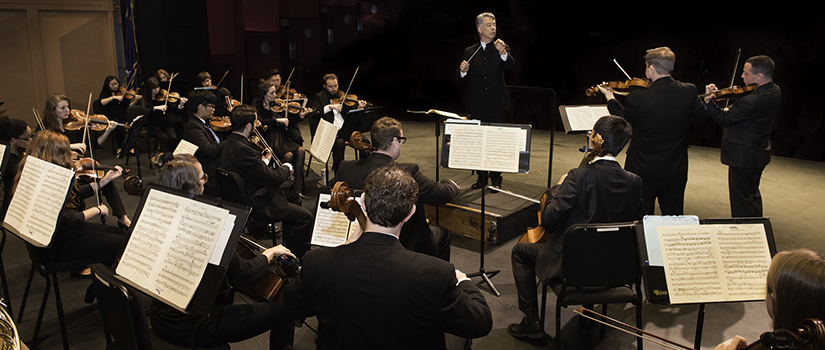USC Symphony Orchestra presents music by Rouse and Mozart on Feb. 21
The USC Symphony Orchestra, the premier orchestra at the University of South Carolina and one of the leading ensembles in the Southeast, presents the next concert Thursday, February 21, at the Koger Center for the Arts. The concert begins at 7:30 p.m., and conductor Scott Weiss presents a pre-concert talk at 6:45 p.m. on the Koger stage. Valet parking is available. The concert program includes Christopher Rouse’s Flute Concerto and Mozart’s Symphony No. 40.
American composer Christopher Rouse takes us on a wild ride with Flute Concerto. Fanfare calls it “possibly the most expressive music Rouse has written.” American Record Guide wrote, “...Rouse, born 1949, does have a lighter side, apparent in the Celtic-tinged arabesques given to the soloist in the Flute Concerto's allegros.” Jennifer Parker-Harley, associate professor of flute, performs as soloist on the concert. Parker-Harley is an active recitalist, and prizewinner in several national competitions, including the 1998 and 2001 National Flute Association’s Young Artist Competitions, she appears as a frequent performer at their annual convention and in schools and music series across the country.
Rouse’s Flute Concerto, dedicated to the composer’s wife Ann, premiered in 1994 and immediately attracted numerous flutists and conductors, many of whom hailed it as the greatest concerto for the instrument since Mozart’s. It has since become his most performed concerto. Although both of his parents’ families immigrated to America before the Revolutionary War, Rouse feels a deep ancestral tug of recognition whenever exposed to the arts and traditions of the British Isles, particularly those of Celtic origin.
Composed in 1788, Symphony No. 40 in G minor is one of only two symphonies Mozart wrote in minor keys and reflects his interest in the artistic movement known as Sturm und Drang (Storm and Stress), in which darker and stronger emotions were showcased. The year was a dark one for Mozart – Viennese audiences were less eager to hear his concerts and recitals, his bills were piling up, and his infant daughter died. Letters to friends reveal that he was finding it difficult to look beyond the shadows, and some have suggested that this influenced the unusually anxious symphony. At the time, German and Austrian composers were increasingly drawn to the Sturm und Drang movement, a school of thought that also affected artists and writers, and in response, composers began producing works that were the audible expression of angst. Robert Schumann, on the other hand, saw Mozart’s Symphony No. 40, as a counter to the notion of G minor as a somber key and declared that it has “buoyant Hellenic charm.”
Tickets
USC Students - free with student ID (must be picked up from the Koger before 5:00 p.m. on the day of the performance). General public - $30; senior citizen/USC faculty and staff - $25; children under 18 and non-USC students with ID - $5. Call 803-251-2222 or Koger Box Office, corner of Greene and Park Streets (M-F 9 a.m. to 5 p.m.) or online at kogercenterforthearts.com. Discounted tickets must be purchased at the box office.
